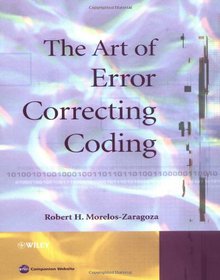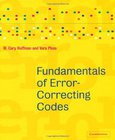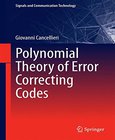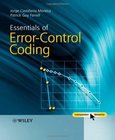The Art of Error Correcting Coding

Book Details:
| Publisher: | Wiley |
| Series: | Wiley |
| Author: | Robert H. Morelos-Zaragoza |
| Edition: | 1 |
| ISBN-10: | 0471495816 |
| ISBN-13: | 9780471495819 |
| Pages: | 238 |
| Published: | Apr 22 2002 |
| Posted: | Nov 19 2014 |
| Language: | English |
| Book format: | DJVU |
| Book size: | 2.58 MB |
Book Description:
The Art of Error Correcting Coding provides a comprehensive coverage of the basic techniques of error concealment. It addresses the need for selecting, implementing and simulating algorithms for the encoding and decoding of codes used for error correction and detection. This practical approach uses simple and easy to follow numerical examples to describe the basic concepts of a particular coding or decoding scheme. Basic analysis tools are provided throughout to help in the assessment of the error performance block and convolutional codes of a particular Error Correcting Coding (ECC) scheme for a selection of the basic channel models.* Provides a complete treatment of important decoding algorithms including errors-and-erasures decoding of BCH and Reed-Solomon codes for any set of consecutive zeros and any length* Describes Viterbi decoding and the key implementation issues* Includes soft-output decoding algorithms, MAP, log-MAP, Max-log-MAP, belief propagation and ordered statistics* Discusses new reliability-based algorithms such as GMD and the Chase algorithm with soft outputs* Examines turbo codes, both serially and parallel concatenated, as well as low-density parity-check (LDPC) codes and their iterative decoders* Features a companion website providing computer programs written in C language, to help understanding and implementing basic ECC techniquesThis volume provides an indispensable tool for understanding and applying ECC techniques in transmission and storage of digital information. Engineers, computer scientists and graduate students alike, will all benefit from such a practical introductory approach.
Download Link:
Related Books:
Fundamentals of Error-Correcting Codes
Fundamentals of Error Correcting Codes is an in-depth introduction to coding theory from both an engineering and mathematical viewpoint. It reviews classical topics, and gives much coverage of recent techniques which could previously only be found in specialist publications. Numerous exercises and examples and an accessible writing style make this a lucid and effective introduction to coding theory for advanced undergraduate and graduate students, researchers and engineers - whether approaching the subject from a mathematical, engineering or computer science background....
Polynomial Theory of Error Correcting Codes
The book offers an original view on channel coding, based on a unitary approach to block and convolutional codes for error correction. It presents both new concepts and new families of codes. For example, lengthened and modified lengthened cyclic codes are introduced as a bridge towards time-invariant convolutional codes and their extension to time-varying versions. The novel families of codes include turbo codes and low-density parity check (LDPC) codes, the features of which are justified from the structural properties of the component codes. Design procedures for regular LDPC codes are proposed, supported by the presented theory. Quasi-cyclic LDPC codes, in block or convolutional form, represent one of the most original contributions of the book. ...
Essentials of Error-Control Coding
Rapid advances in electronic and optical technology have enabled the implementation of powerful error-control codes, which are now used in almost the entire range of information systems with close to optimal performance. These codes and decoding methods are required for the detection and correction of the errors and erasures which inevitably occur in digital information during transmission, storage and processing because of noise, interference and other imperfections.Error-control coding is a complex, novel and unfamiliar area, not yet widely understood and appreciated. This book sets out to provide a clear description of the essentials of the subject, with comprehensive and up-to-date coverage of the most useful codes and their decoding algorithms. ...
2007 - 2021 © eBooks-IT.org



